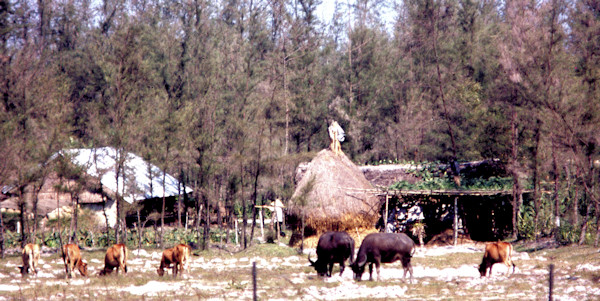
About |
F
E
A
R
by Michael T. Martin
 Farm outside Phu Bai airbase perimeter |
|---|
|
There was only one ground attack I remember at Phu Bai, but there were rocket and mortar attacks on and off. One daylight B-40 attack I remember quite well. My duty station was between the runway and a parking tarmac under the overlooking control tower of the airfield. I worked in a fiberglass dome, tending the airport radars. Close to the dome were two green sand-bag bunkers for refuge during attacks. A B-40 rocket slammed into the tarmac at mid-day unforewarned. The B-40 had a big warhead. The loud fizz ended in a louder cush sound followed immediately by the KAH WHUMP. I noticed each split-second element because the closeness of the explosion to my work area stretched time out toward infinity. I immediately ran from the fiberglass dome and dove into the enlisted men's bunker. I was able to scrunch up into a sitting position with about a dozen others. As I looked around I saw that in our midst was a lieutenant. Officers and Staff NCOs were supposed to use a separate bunker only a couple yards from ours, but he had apparently opted for the first bunker he'd encountered. Inside the bunker daylight from the entrance was dimmed but we were all plainly visible to each other. And all plainly scared. The military mystique requires that officers be given unquestioned respect. The cramped quarters of the bunker did not allow for military courtesy, so we tried to ignore the officer in our midst. The second B-40 crunched closer than the first and we all flinched. Maybe a minute later the third was closer still and the normal muscle tone I took for granted began to waver. After another interval a fourth B-40 impacted yet closer and jarred each of us from denial. It was apparent that the enemy had fired a "stick" of rockets preset to land one after the other in a line. The line had been aimed at the control tower and was now walking across the tarmac into our duty station. We all recognized the presence of danger and there was nothing we could do about it but wait. We looked at each other for comfort, then looked quickly away recognizing our common terror. The lieutenant, who a few days before had shared a birthday cake he received in the mail with photos of his wife and daughter, began to whimper in fear. Another B-40 exploded less than fifty yards away from our bunker, the sounds of gravel clattered on nearby corrugated steel roofs punctuating the proximity. I felt fear seeping into my stomach, my muscles losing steadiness. The lieutenant began shaking sobs, as contagious as a yawn. A corporal who had been wounded during the siege of Khe Sanh was sitting next to him near the entrance to the bunker. The corporal had occasionally showed us how his skin would rise in pointed peaks to a strong magnet pulling at the shrapnel still within his arm. He looked at me uncomfortably and said "The controllers will need to use the mini tower. I'll go start it up." He crawled out of the bunker. I knew what he meant, and I also knew it wasn't necessary to do so during the attack. But then the lieutenant going to pieces was unsettling. The corporal would rather go outside and face the danger rather than crack under the pressure of waiting for the next rocket. It was stupid. The next rocket would be spewing molten shrapnel all over the duty station. We were safe in the bunker, protected by two feet of sandbagged steel reinforced walls. As the corporal left the bunker I watched the lieutenant unraveling and I felt my own fear fraying nerves under a flaccid skin. I was determined not to break, but there was only one way to prevent it. I said to the others, "I'll give him a hand," and crawled out after the corporal. The mini-tower was an exposed fiberglass and aluminum scaffolding about twenty yards from the bunker. It was rigged with radios to control airport air traffic during an emergency when the main tower was unavailable. The radios had to be turned on and warmed up. The corporal climbed the aluminum ladder to the mini tower and started the radios. I had followed and climbed right behind him. I was a radar technician, I knew very little about radios. I only knew if I stayed in that bunker I would succumb to fear. After Pearl Harbor started World War Two, President Franklin Delano Roosevelt had said that "the only thing we have to fear is fear itself." Fear of fear can be a powerful force. Standing exposed on the scaffolding of the mini-tower I was no longer afraid. I felt somehow in control: I was able to do something, even if it was stupid. That was better than cowering in the bunker waiting to die. We worked on the radios while waiting for the next rocket that never came. In retrospect, I now recognize the second essential quality necessary to overcome fear. The people I knew who fell to fear were older men with families and children. We who were younger had one seemingly unimpeachable quality that allowed us to ignore danger until it passed. It is, I believe, the second quality necessary to overcome fear. It was something that the senior men had lost somewhere. That quality was stupidity.
|